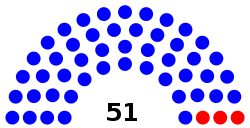New York City Council
| New York City Council | |
|---|---|
 |
|
 |
|
| Type | |
| Type | |
| Leadership | |
|
Speaker
|
|
|
Majority Leader
|
|
|
Minority Leader
|
|
| Structure | |
| Seats | 51 |
 |
|
|
Political groups
|
Democratic: 48 seats
Republican: 3 seats
|
| Committees | See Standing Committees |
| Elections | |
| First-past-the-post | |
|
Last election
|
November 5, 2013 |
|
Next election
|
November 7, 2017 |
| Meeting place | |
| New York City Hall, Manhattan | |
| Website | |
| www.council.nyc.gov | |
The New York City Council is the lawmaking body of the City of New York. It has 51 members from 51 council districts throughout the five boroughs.
The Council serves as a check against the mayor in a "strong" mayor-council government model. The council monitors performance of city agencies and makes land use decisions as well as legislating on a variety of other issues. The City Council also has sole responsibility for approving the city budget and each member is limited to two consecutive terms in office and can run again after a four-year respite. The head of the City Council is called the Speaker, and is currently Melissa Mark-Viverito, a Democrat. The Speaker sets the agenda and presides at meetings of the City Council. Proposed legislation is submitted through the Speaker's Office. There are 47 Democratic council members led by Majority Leader Jimmy Van Bramer. The three Republican council members are led by Minority Leader Steven Matteo. There is one vacancy.
The Council has 35 committees with oversight of various functions of the city government. Each council member sits on at least three standing, select or subcommittees (listed below). The standing committees meet at least once per month. The Speaker of the Council, the Majority Leader, and the Minority Leader are all ex officio members of every committee.
Council members are elected every four years, except for two consecutive two year terms every twenty years to allow for redistricting between the terms due to the national census (starting in 2001 and 2003 for the 2000 Census and again in 2021 and 2023 for the 2020 Census).
...
Wikipedia
